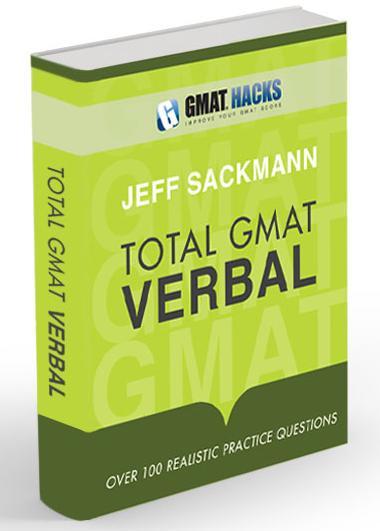
Bookshelf
|
|
Total GMAT Math Jeff's complete Quant guide, on sale now! |
|
|
Total GMAT Verbal Everything you need to ace GMAT Verbal! |
1,800 Practice Math Questions
Buy Jeff's books at Amazon.com

GMAT Official Guide, with IR
OG Math | OG Verbal
OG12 & Quant Rev solutions!
GMAT Question of the Day
Beginner's Guide to the GMAT
GMAT Hacks Affiliate Program

Recent Hacks

Categories
- General Study Tips
- Goals and Planning
- CAT Strategy
- The Mental Game
- GMAT Math Strategy
- GMAT Math Topics
- Mental Math
- Data Sufficiency
- Critical Reasoning
- Reading Comprehension
- Sentence Correction
- Analytical Writing Assessment
- Integrated Reasoning
- IR Explained
- Business School Admissions
- GMAT Prep Resources
- Practice Questions
- Total GMAT Math
- Total GMAT Verbal
- GMAT 111

Take Control of the GMAT Computer Adaptive Test
| You should follow me on Twitter. While you're at it, take a moment to subscribe to GMAT Hacks via RSS or Email. |
It's a recurring theme in GMAT preparation: it's all about managing your time. It doesn't matter how carefully you pore over a Reading Comprehension passage or analyze the twists in a Data Sufficiency problem if you can't finish the test in the allotted time. And the time allowed just isn't much.
Because the GMAT is an adaptive test, it's virtually a given that you will get questions wrong. You can get a handful of questions wrong on each section and still get a 700 or higher on the test. The questions you get wrong (and the ones you answer correctly!) will be very hard ones, but you'll still miss a few. The trick, then, is using that knowledge to your advantage.
GMAT Triage
On other standardized tests, this is easy: you can flip through the pages of your exam booklet, looking for the questions you know you can nail before moving on to others. On the GMAT, of course, you only see one question at a time, and you must answer it before you get to see another one. If you decide to guess, or you realize later that you did it wrong, you never get another chance.
This makes triaging more difficult, but it's still possible–and important. For each question you see, you need to make a quick judgment–really, this should be no more than 3-5 seconds of analysis–of whether you can do the question, and how long it'll take you.
Skip, Skip, Skip!
If you see a question that you are sure would take you a long time, or you really don't know how to approach, you have two choices. First, you can skip it. Second, you can invest 30-60 seconds looking for a way into the question–one that won't take too much time, but might yield a quick method, or a way to eliminate a few wrong answer choices. Depending on the complexity of the question, either one is valid.
If you choose the second method, though, watch the clock closely. If you spend a minute looking for a new perspective on a difficult question, don't let it drag on. It's too easy to get into non-test problem-solving mode and spend five fruitless minutes. Do that once, and you guarantee yourself a half-hour of stress as you do battle with the clock. Do it twice, you can kiss your dream GMAT score goodbye. Sound melodramatic? It is. It's also true.
Taking Control
The key concept here is that by skipping questions that are too tough for you, you choose which questions you get wrong. Further, you don't waste time on them. I don't have exact numbers, but I would guess from looking at practice-test results that, when a test-taker spends 3.5 minutes or more on a single question, s/he gets it wrong at least half the time. It's a questionable use of your time when you get it right; it's a disaster when you get it wrong.
By choosing which questions to miss, you give yourself more time to answer the ones you do have confidence on. You also reduce the stress of the timed test and you feel like you–not a soulless computer monitor in front of you–are in full control.
Of course, you'll probably miss a few questions that you didn't intend to get wrong–that's just the way it goes. But simply electing to skip 3-5 questions that are too difficult for you can save you as much as 15 minutes to use on the rest of the test section. That's almost 30 more seconds–an extra 25%–for every question you don't skip!
Practicing This Skill
As you approach your test date, particularly in the last week or two, practice triaging. Make a quick judgment of just how hard the question is. However, unlike on the test, try to do the question anyway. You might learn, especially at first, that your snap judgment was wrong. If so, analyze why: did you overestimate your skills? Do you need additional practice in certain areas? Can you correctly answer questions that look hard at first sight?
It's simple: you can either let difficult questions ruin your test-day experience, or you can use them to make the whole exam less stressful. It just takes a new mindset and a little practice.
About the author: Jeff Sackmann has written many GMAT preparation books, including the popular Total GMAT Math, Total GMAT Verbal, and GMAT 111. He has also created explanations for problems in The Official Guide, as well as 1,800 practice GMAT math questions.
 |
Total GMAT Verbal
The comprehensive guide to the GMAT Verbal section. Recognize, dissect, and master every question type
you'll face on the test. Everything you need, all in one place, including 100+ realistic practice questions. |